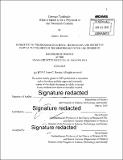Herman Feshbach : what it meant to be a physicist in the twentieth century
Author(s)
Becerra, Juana C
DownloadFull printable version (5.128Mb)
Alternative title
What it meant to be a physicist in the twentieth century
Other Contributors
Massachusetts Institute of Technology. Department of Physics.
Advisor
David Kaiser.
Terms of use
Metadata
Show full item recordAbstract
This thesis is a biographical snapshot of physicist Herman Feshbach (1917-2000). Herman Feshbach was a nuclear physics that spent over three-quarters of his life at the Massachusetts Institute of Technology. His life is a window through which I analyze the changes experienced by the physics community throughout World War II and the postwar era. The events that I narrate are centered in New York, where Feshbach's early life unfolds, and in Cambridge, Massachusetts, where Feshbach matured as a scientist. There are two recurring themes throughout this work.The first theme deals with the ways in which politics, wartime, and government funding place strains and provoke change in scientific practices. The second theme pertains to how scientists accommodate to the aforementioned strains, either through open political activism or changes within scientific institutions. Herman Feshbach's life is an excellent example of how these themes weave into each other, making the boundary between science and society more permeable and porous than it is usually presented.
Description
Thesis: S.B. in Science, Technology and Society, Massachusetts Institute of Technology, Department of Physics, 2015. Cataloged from PDF version of thesis. Includes bibliographical references (pages 89-92).
Date issued
2015Department
Massachusetts Institute of Technology. Department of PhysicsPublisher
Massachusetts Institute of Technology
Keywords
Physics.